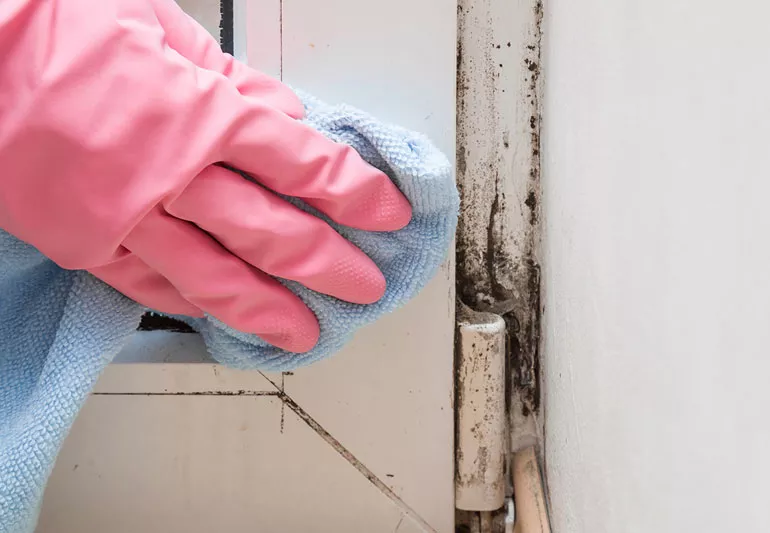You might not realize that common symptoms of mold exposure can manifest in various ways, from respiratory issues to cognitive problems. Feeling a bit off lately? Perhaps it’s worth checking if your environment could be affecting your health. Symptoms like coughing, skin irritations, and headaches could be more than just a passing nuisance. Before you brush off these signs, consider how they might be linked to mold lurking in your surroundings. So, what are the steps to take if you suspect mold exposure is the culprit behind your health woes?
Respiratory Symptoms
Wondering if your respiratory symptoms could be due to mold exposure?
Mold exposure can trigger a range of respiratory issues, particularly in individuals with allergies or asthma.
If you find yourself coughing more frequently or experiencing wheezing and chest tightness, mold may be the culprit.
Mold spores can be inhaled, leading to irritation in the airways and exacerbating existing respiratory conditions.
Coughing is a common symptom of mold exposure as the body tries to expel the irritants.
Wheezing, a high-pitched whistling sound when breathing, and chest tightness can also indicate that mold is affecting your respiratory system.
These symptoms may worsen in areas with high mold concentrations or in poorly ventilated spaces where mold can thrive.
If you suspect mold exposure is causing your respiratory symptoms, it’s essential to address the issue promptly.
Removing the mold source, improving ventilation, and using air purifiers can help alleviate these symptoms.
Seeking medical advice is advisable, especially if you have underlying respiratory conditions that may be aggravated by mold exposure.
Skin Reactions
Exposure to mold can also manifest in various skin reactions, indicating potential sensitivity or allergic responses to mold spores.
One common skin reaction to mold exposure is allergic dermatitis, which presents as red, inflamed, and itchy skin. This type of skin condition occurs when the immune system reacts to mold spores that come into contact with the skin, leading to irritation and discomfort.
If you notice persistent redness, itching, or a rash that seems to worsen in certain environments or locations, it could be a sign of mold-related skin sensitivity. It’s essential to seek medical advice to determine the cause of these symptoms and explore potential solutions.
To manage skin reactions caused by mold exposure, it’s vital to identify and eliminate the source of mold in your environment. Moreover, using hypoallergenic skincare products and maintaining good personal hygiene can help alleviate symptoms and prevent further skin irritation.
Cognitive Issues
If you experience difficulties with memory, concentration, or thinking processes, these cognitive issues could be potential symptoms of mold exposure. Mold exposure has been linked to cognitive problems such as memory loss and concentration difficulties.
Memory loss may manifest as forgetting recent events, struggling to recall information, or experiencing gaps in memory. Concentration difficulties can make it challenging to focus on tasks, follow conversations, or maintain attention for extended periods. These cognitive issues may impact your daily life, affecting work performance, academic success, and personal relationships.
When exposed to mold, certain compounds released by mold spores, known as mycotoxins, can enter your body and affect your brain function. These mycotoxins have been associated with neurotoxicity, which can lead to cognitive impairments.
If you suspect mold exposure and are experiencing cognitive issues, it’s essential to address the mold problem promptly and seek medical advice to assess and manage any cognitive symptoms. By taking proactive steps to eliminate mold and improve indoor air quality, you can potentially alleviate cognitive issues associated with mold exposure.
Fatigue and Weakness
Feeling drained of energy and experiencing physical weakness could indicate potential symptoms of mold exposure. Mold exposure can lead to fatigue and weakness due to the mycotoxins released by certain types of mold. If you find yourself constantly tired and lacking the strength to perform daily tasks, mold exposure might be the culprit.
Muscle aches are another common symptom that can accompany fatigue and weakness when exposed to mold. These aches can manifest in various parts of the body and mightn’t be relieved by typical pain management methods.
Moreover, sleep disturbances are often linked to mold exposure, further contributing to feelings of fatigue. If you’re experiencing difficulties falling asleep, staying asleep, or waking up feeling unrested, it’s essential to take into account the possibility of mold in your environment.
If you’re noticing a combination of fatigue, weakness, muscle aches, and sleep disturbances, it’s advisable to consult with a healthcare professional to determine if mold exposure could be the underlying cause of these symptoms.
Headaches and Sinus Problems
Headaches and sinus problems commonly manifest as symptoms of mold exposure, often causing discomfort and impacting daily functioning. Mold spores can trigger allergic reactions in sensitive individuals, leading to sinus congestion, pressure, headaches, and even migraines. Environmental factors such as high humidity levels and poor ventilation can contribute to mold growth, exacerbating these symptoms.
To address these issues, prevention strategies are vital. Regularly inspecting your home for any signs of mold, keeping humidity levels below 60%, and ensuring proper ventilation in damp areas like bathrooms and basements can help prevent mold growth. Moreover, conducting allergy testing to identify specific mold allergens can aid in developing targeted treatment options.
When experiencing headaches and sinus problems due to mold exposure, seeking medical advice is essential. Treatment options may include over-the-counter or prescription medications to alleviate symptoms, nasal sprays to reduce inflammation, and allergy shots for long-term management.
Conclusion
To sum up, if you notice coughing, wheezing, itching skin, memory problems, or persistent fatigue, it may be a sign of mold exposure. Don’t ignore the warning signs – address the potential source of mold, improve ventilation, and seek medical advice.
Remember, mold symptoms are like a hidden storm brewing within your home, silently affecting your health. Don’t wait for it to strike – take action now to protect yourself and your loved ones.
Need a qualified mold doctor? Visit https://moldtreatmentcenter.com today.

